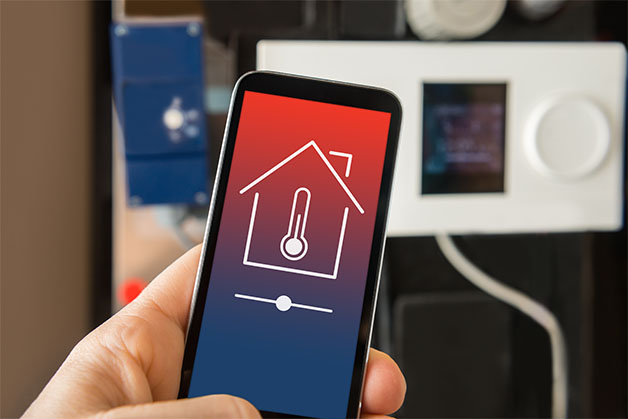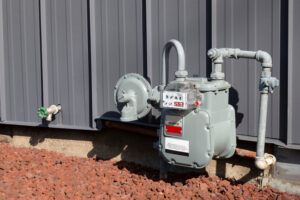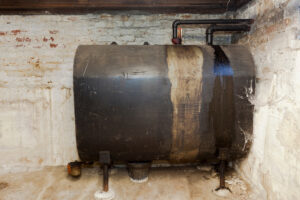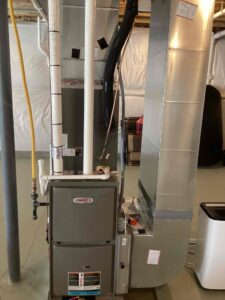8 Key Considerations When Switching from Oil to Natural Gas Heating

There’s a lot to learn before jumping to natural gas as your home’s new heating fuel source. Become equipped with all the information you need to make the right decision for your home.
Last Revised: February 9, 2024
Read Time: 7 min.
Did you know that nearly 50% of homes nationwide rely on natural gas as a heating source? Every year more and more homeowners are ditching their old oil tanks and making the switch.
This begs the question: Why? Why go through the hassle of replacing your oil tank with a natural gas line?
Everyone has their own answer to this question, but the reality is that there are advantages and disadvantages to heating your home with both oil and natural gas. When making the decision for your own home, we recommend examining these eight important aspects of the two choices:
- Natural Gas Access
- Installation Costs
- Fuel Costs
- Fuel Efficiency
- Carbon Emissions
- Lifespan Expectations
- Safety Considerations
- Maintenance Considerations
As heating experts, we’re happy to share our knowledge on each of these considerations and to also provide helpful statistics to clarify your decision. As you begin to understand the differences between oil and natural gas, you’ll be able to conclude which option is best for you.
By the end of this article, you’ll be able to understand how the top factors stack up against your own priorities when comparing oil and natural gas as home heating fuel sources.
1. Natural Gas Access
There is one major prerequisite that anyone who wants to install a natural gas line must meet: access to a natural gas line.
Natural gas is supplied to individual homes by energy companies via underground supply lines. As natural gas has grown in popularity, energy companies have invested in expanding these pipeline networks. However, there are still many homes that don’t have access in their neighborhood.
If you’re unsure if natural gas is available in your neighborhood, there are many resources available to learn more about your local energy companies.
If you don’t have natural gas access and would like to make the switch, there is a Neighborhood Pilot Program designed to bring an extension to any neighborhood with at least 20% participation. It may be worth talking to your neighbors about their stance on natural gas.
2. Installation Costs
Whether or not you’re more interested in oil or natural gas heat, you’ll want to get an idea of how much installing a new furnace will cost as soon as you can. There’s no getting around the fact that up-front expenses are a big part of the picture.
The installation of a new oil furnace tends to cost between $7,000 and $14,000. Because this is a simple replacement, total expenses can be expected to stop here. Oil furnace replacements don’t entail the investments tied to switching to natural gas.
Natural gas conversions are a multi-staged process. First, you’ll have to have work done to connect your house to a public natural gas line, if available to you. Then you’ll need to install a new natural gas furnace. And finally, you’ll probably want to remove your old oil tank.
The main factor in determining the cost of hooking up your house is the distance from the street to your home. Typically, this type of gas line is $30 to $75 per foot. This leads to average total costs of this part of the process to range from $500 to $2,000.
The second part of making the switch to natural gas is installing a new natural gas furnace in your home. This equipment and work should total anywhere from $6,000 to $13,000.
If you do decide to transition to natural gas, it’s also be a good idea to remove your old tank. Taking away a smaller above-ground tank should be under $1,000. However, larger underground tank removals can approach $3,000. When you talk with an HVAC professional, be sure to ask about how tank removals can ensure you comply with local environmental codes.
3. Fuel Costs
The cost of fuel is also likely at the top of your list when looking at different heating options.
According to data and forecasts from the US Energy Information Administration (EIA), natural gas fuel prices are expected to decrease by 14% year over year. Increased production of natural gas and fully stocked inventories of the fuel are leading to the price drop.
In October 2023, the EIA forecasted the cost to heat the average home with natural gas to be roughly $600 for the winter. This forecast is 68% cheaper than the forecasted $1,850 price to heat your home with oil during the same time.
It’s important to know that oil prices are volatile and subject to change, but natural gas prices are trending to be cheaper than oil for the foreseeable future.
4. Fuel Efficiency
The efficiency of the fuel you use is central to the long-term costs tied to heating your home. Examining it provides more insight as to which option will save you more money in the long run.
The Annual Fuel Utilization Efficiency Rating Scale (AFUE) is a model that allows us to compare the efficiency of different heating systems available. While the precise measure of efficiency can vary slightly from house to house, natural gas and oil burners can expect to produce heat at 98% AFUE and 87% AFUE respectively.
This means that when compared unit for unit, natural gas is about 11% more efficient as a heating source than oil.
5. Carbon Emissions
The impact your fuel has on the environment may be a major factor in your heating source decision-making process. As climate change continues to impact the outlook of our planet, smart environmental decisions made today could make a difference for future generations.
When it comes to your home’s carbon footprint, natural gas produces about 53 kilograms of carbon dioxide per million BTU (British thermal units) of heat. Conversely, oil produces about 74 kilograms at the same heat levels.
This data comes from the EIA, and concludes that natural gas produces about 28% fewer greenhouse gas emissions than oil.
6. Lifespan Expectations
It’s smart to set your own expectations for how long your oil or natural gas furnace will last. Properly maintaining your heating system will maximize its lifespan, but the reality is that the expected longevity of oil and natural gas heating systems are different.
On average, oil furnaces will last 15-20 years when properly maintained. Whereas Natural gas heating systems that are kept clean and efficient will last between 10 and 15 years.
If the lifespan of your new system is your top priority, oil furnaces and boilers are superior to natural gas.
7. Safety Considerations of Each System
No matter how you fuel your home, any HVAC professional will recommend that your heating system receives a yearly inspection and servicing to ensure that they are operating safely and efficiently.
Both natural gas and oil can potentially give off carbon monoxide if the heating system isn’t properly maintained, so installing a carbon monoxide detector is always recommended. Leaks and malfunctioning burners in both systems are also potential fire hazards and can harm the air quality in your home.
It’s important to know that both oil and natural gas furnaces have the potential to be major fire hazards if gone years without proper maintenance. The best way to ensure the safety of your system is to regularly schedule professional tune-ups.
8. Maintenance Tasks Involved with Each System
Furnaces and boilers that are fueled by oil will require more thorough maintenance than natural gas systems, as soot and grime will naturally build up over time. Cleaning out the combustion chamber, heat exchanger and flue pipe once a year will help your furnace run smoothly and prolong its lifespan. Other oil furnace maintenance tasks include replacing the oil and air filters.
At Mattioni, you can schedule an oil furnace or boiler cleaning for $199.
Natural gas systems can become both a fire and safety hazard if a leak develops, as gas could be loose near the combustion chamber and throughout your home. To prevent these hazards, natural gas furnaces also require inspections and cleanings. These cleanings are far less time-consuming and expensive than oil systems and are usually $50 to $80.
As you can see, both natural gas and oil heating systems will require upkeep and regularly scheduled maintenance appointments. The tasks involved with keeping an oil tank clean, however, are more involved than those with natural gas, so from a maintenance perspective natural gas is simpler for the average homeowner.
If you’re unsure of the last time your furnace or boiler was inspected, reach out to Mattioni for a consultation.
What’s the Best Choice?
When evaluating these two viable heating options, the first piece of information you need is if natural gas is available in your area. If it’s not, unfortunately you won’t be able to add a natural gas line to your home until an energy company installs a public line to your street.
Both options are safe when properly maintained, however natural gas is a much simpler system to inspect and clean. Installation and ongoing fuel costs are cheaper with natural gas. Carbon emissions and environmental factors also point to natural gas as the cleaner resource. However, oil furnaces can be expected to last 5-10 years longer than a natural gas system.
When it comes time for you to make your decision, you’ll want to evaluate your own priorities, desires and financial situation to create a plan that works for you.
Mattioni Plumbing, Heating & Cooling Can Help
Although your fuel source largely only impacts your life during the cold winter months, it helps to start the conversation months in advance. This will allow for ample time as you need to evaluate your options and have work done on your property before temperatures drop below freezing levels.
It’s not uncommon for energy companies to have a six to eight week waiting period for new gas line hookups. If you have an older furnace, choosing your home’s new heating plan before winter is a wise approach as your furnace may malfunction at any time.
If for some unforeseen reason you find yourself without heat for an extended period, Mattioni offers temporary solutions that help to minimize the burden felt by you and your family while you wait to receive access to natural gas.
Call your friendly experts at Mattioni Pluming, Heating and Cooling today at 610-400-8510 to discuss all your home heating options, or schedule a free, no-risk consultation online.
Financing options, including 12-months interest free, are available on all of our work. If you’re unsure if you will qualify, our Prequalification Tool can help you learn more about your options.








